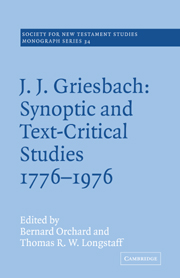Book contents
- Frontmatter
- Contents
- Portrait of J. J. Griesbach
- Copy of Colloquium announcement
- List of participants and selected observers
- Preface
- Abbreviations
- 1 The genesis of the Colloquium
- 2 Johann Jakob Griesbach: his life, work and times
- 3 The Gospel synopsis from 1776 to the present day
- 4 Griesbach's answer to the Synoptic Question
- 5 Commentatio qua Marci Evangelium totum e Matthaei et Lucae commentariis decerptum esse monstratur
- 6 A demonstration that Mark was written after Matthew and Luke
- 7 Griesbach and the development of text criticism
- 8 Modern text criticism and the Synoptic Problem
- 9 At the Colloquium's conclusion
- 10 The Griesbach Hypothesis: a bibliography
- Notes
- Appendix
- Index
Preface
Published online by Cambridge University Press: 23 December 2009
- Frontmatter
- Contents
- Portrait of J. J. Griesbach
- Copy of Colloquium announcement
- List of participants and selected observers
- Preface
- Abbreviations
- 1 The genesis of the Colloquium
- 2 Johann Jakob Griesbach: his life, work and times
- 3 The Gospel synopsis from 1776 to the present day
- 4 Griesbach's answer to the Synoptic Question
- 5 Commentatio qua Marci Evangelium totum e Matthaei et Lucae commentariis decerptum esse monstratur
- 6 A demonstration that Mark was written after Matthew and Luke
- 7 Griesbach and the development of text criticism
- 8 Modern text criticism and the Synoptic Problem
- 9 At the Colloquium's conclusion
- 10 The Griesbach Hypothesis: a bibliography
- Notes
- Appendix
- Index
Summary
The aim of this volume is to provide the reader with basic information about the life, work and influence of Johann Jakob Griesbach (1745–1812) and to indicate why an understanding of this scholar's contributions to New Testament criticism is important both for the history of New Testament scholarship and for contemporary research. Griesbach was perhaps the most noteworthy and influential Biblical scholar during the last quarter of the eighteenth century – the age of the French and American Revolutions. The editors of this volume are firmly convinced that, after being forgotten and ignored for more than a century, his ideas, suitably brought up to date, have a great deal to offer to twentieth-century New Testament studies.
Griesbach spent long hours in the attempt to find the best readings among the many variants in the New Testament. His work laid the foundations of modern text criticism and he is, in no small measure, responsible for the secure New Testament text which we enjoy today. Many of his methodological principles continue to be useful in the process of determining the best readings from among the many variants which remain.
But Griesbach was first and foremost a theologian concerned with the issues of faith and life in his own time. In this regard he firmly believed that theology requires a clear understanding of the sources from which it proceeds.
- Type
- Chapter
- Information
- Publisher: Cambridge University PressPrint publication year: 1979

